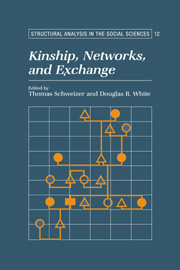Book contents
- Frontmatter
- Contents
- Preface
- List of contributors
- 1 Revitalizing the Study of Kinship and Exchange with Network Approaches
- I Representing Kinship Dynamics, Material Flow, and Economic Cooperation
- II Individual Embeddedness and the Larger Structure of Kinship and Exchange Networks
- III Marriage, Exchange, and Alliance: Reconsidering Bridewealth and Dowry
- 9 Wealth Transfers Occasioned by Marriage: A Comparative Reconsideration
- 10 Prestations and Progeny: The Consolidation of Well-Being among the Bakkarwal of Jammu and Kashmir (Western Himalayas)
- 11 “We Don't Sell Our Daughters”: A Report on Money and Marriage Exchange in the Township of Larantuka (Flores, E. Indonesia)
- IV Emergence, Development, and Transformation of Kin-Based Exchange Systems
- Index
9 - Wealth Transfers Occasioned by Marriage: A Comparative Reconsideration
Published online by Cambridge University Press: 05 November 2011
- Frontmatter
- Contents
- Preface
- List of contributors
- 1 Revitalizing the Study of Kinship and Exchange with Network Approaches
- I Representing Kinship Dynamics, Material Flow, and Economic Cooperation
- II Individual Embeddedness and the Larger Structure of Kinship and Exchange Networks
- III Marriage, Exchange, and Alliance: Reconsidering Bridewealth and Dowry
- 9 Wealth Transfers Occasioned by Marriage: A Comparative Reconsideration
- 10 Prestations and Progeny: The Consolidation of Well-Being among the Bakkarwal of Jammu and Kashmir (Western Himalayas)
- 11 “We Don't Sell Our Daughters”: A Report on Money and Marriage Exchange in the Township of Larantuka (Flores, E. Indonesia)
- IV Emergence, Development, and Transformation of Kin-Based Exchange Systems
- Index
Summary
INTRODUCTION
The theory of marriage payments has been oriented toward explaining why various categories of practice take place under particular ecological and technological conditions (Bossen 1988; Goody 1973; Spiro 1975; Harrel and Dickey 1985; Kressel 1977; Schlegel and Eloul 1988; Tambiah 1989; and others). This effort has been productive of a wide range of important analytical findings. However, the results of this chapter suggest that some of that work should be reconsidered by reference to a more systematic and scientifically established set of analytical categories.
The attempt here is to observe wealth transfers associated with marriage in all forms of society and to reexamine those transfers on the basis of a set of theoretical understandings that have, heretofore, remained only inchoate in the literature. The principal theoretical issue is the importance of identifying individuals as incumbents of person-categories within socially constructed collectivities. The prevailing analytical perspective tends to present reciprocity as the elementary unit of social action, as is well illustrated by the influential work of Sahlins (1972), and it presents the individual as the elementary social actor. This perspective is related to a view of human action that has deep roots in post- Enlightenment thought, but it constitutes, I believe, a serious disability for the advancement of our understanding of a broad range of social processes.
- Type
- Chapter
- Information
- Kinship, Networks, and Exchange , pp. 187 - 209Publisher: Cambridge University PressPrint publication year: 1998
- 4
- Cited by

